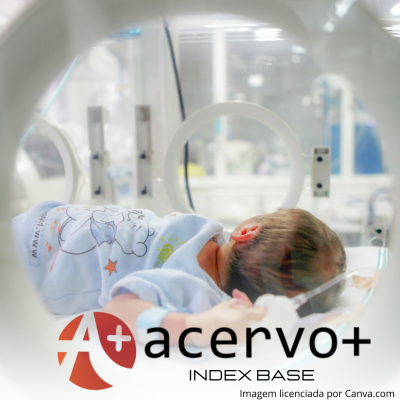Cafeína no tratamento da apneia de prematuros
##plugins.themes.bootstrap3.article.main##
Resumo
Objetivo: Avaliar a eficácia e segurança do uso da cafeína no tratamento da apneia da prematuridade, considerando seus efeitos no sistema respiratório e no neurodesenvolvimento. Revisão bibliográfica: A apneia da prematuridade é uma condição comum em neonatos pré-termo, resultante da imaturidade do sistema respiratório e dos centros de controle da respiração no cérebro. Essa condição pode levar à hipoxemia, comprometendo o cérebro em desenvolvimento, além de outros órgãos, como os pulmões e o intestino. Se não tratada, a apneia pode progredir para falência respiratória. A cafeína é uma opção terapêutica eficaz, agindo como antagonista dos receptores de adenosina A1 e A2A no sistema nervoso central. Essa ação estimula o centro respiratório, aumenta o volume corrente e previne episódios de apneia, contribuindo para a estabilização respiratória desses recém-nascidos. Considerações finais: A apneia da prematuridade é um desafio crítico em neonatos pré-termo, com riscos à saúde respiratória e neurológica. A cafeína se destaca como um tratamento eficaz, estimulando o centro respiratório e prevenindo episódios de apneia.
##plugins.themes.bootstrap3.article.details##
Copyright © | Todos os direitos reservados.
A revista detém os direitos autorais exclusivos de publicação deste artigo nos termos da lei 9610/98.
Reprodução parcial
É livre o uso de partes do texto, figuras e questionário do artigo, sendo obrigatória a citação dos autores e revista.
Reprodução total
É expressamente proibida, devendo ser autorizada pela revista.
Referências
2. ARMANIAN AM, et al. Caffeine administration to prevent apnea in very premature infants. Pediatrics and neonatology, 2016; 57: 408–412.
3. CHAVEZ L e BANCALARI E. Caffeine: Some of the evidence behind its use and abuse in the preterm infant. Neonatology, 2022; 119(4): 428–432.
4. CIUFFINI F, et al. How best to capture the respiratory consequences of prematurity? European respiratory review: an official journal of the European Respiratory Society, 2018; 27(147): 170108.
5. DA SILVA JK, et al. A cafeína como droga de primeira escolha no tratamento de recém-nascidos prematuros com apneia. Revista Foco, 2023; 16(11): e3649.
6. DOBSON NR, et al. The Role of Caffeine in Noninvasive Respiratory Support. Clinics in perinatology, 2016; 43: 773-782.
7. EICHENWALD EC, National and international guidelines for neonatal caffeine use: Are they evidenced-based?. Seminars in fetal & neonatal medicine, 2014; 25: 101177.
8. ERICKSON G, et al. Immature control of breathing and apnea of prematurity: the known and unknown. Journal of perinatology: official journal of the California Perinatal Association, 2021; 41: 2111-2123.
9. FIANI B, et al. The Neurophysiology of Caffeine as a Central Nervous System Stimulant and the Resultant Effects on Cognitive Function. Cureus, 2021; 13(5): e15032.
10. JANVIER A, et al. Apnea is associated with neurodevelopmental impairment in very low birth weight infants. Journal of perinatology, 2004; 24: 763–8.
11. MIAO Y, et al. Comparative efficacy and safety of caffeine citrate and aminophylline in treating apnea of prematurity: A systematic review and meta-analysis. PloS one, 2022; 17(9): e0274882.
12. MOHAMMED S, et al. High versus low-dose caffeine for apnea of prematurity: a randomized controlled trial. European journal of pediatrics, 2015; 174: 949–956.
13. MOSCHINO L, et al. Caffeine in preterm infants: where are we in 2020? ERJ open research, 2020; 6(1): 00330–02019.
14. MOSS TJM. Respiratory Consequences of Preterm Birth. Clinical and Experimental Pharmacology and Physiology, 2006; 33: 280–284.
15. NI YN, et al. Sleep apnea-related hypoxic burden as a predictor of pregnancy and neonatal outcome. Sleep medicine, 2024; 119: 432–437.
16. NILSSON PM e IGNELL C. Health consequences of premature birth revisited - what have we learned?.
Acta paediatrica, 2017; 106: 1378-1379.
17. OLIPHANT EA, et al. Caffeine for apnea and prevention of neurodevelopmental impairment in preterm infants: systematic review and meta-analysis. Journal of perinatology: official journal of the California Perinatal Association 2024; 44: 785-801.
18. OLIPHANT EA, et al. Caffeine to prevent intermittent hypoxaemia in late preterm infants: randomised controlled dosage trial. Archives of disease in childhood. Fetal and neonatal edition, 2023; 108(2): 106–113.
19. PACIFICI GM, Clinical pharmacology of caffeine citrate in preterm infants. Medical Express, 2014; 1: 243-250.
20. RODGERS A e SINGH C. Specialist neonatal respiratory care for babies born preterm (NICE guideline 124): a review. Archives of disease in childhood. Education and practice edition, 2020; 105: 355-357.
21. SCHMIDT B, et al. Caffeine for apnea of prematurity: Too much or too little of a good thing. The journal of pediatrics, 2023; 259: 113488.
22. SCHMIDT B, et al. Caffeine therapy for apnea of prematurity. The New England journal of medicine, 2006; 354: 2112-2121.
23. SWEET DG, et al. European Consensus Guidelines on the Management of Respiratory Distress Syndrome. Neonatology, 2019; 115: 432-450.
24. VILLANUEVA GD, et al. Caffeine: cardiorespiratory effects and tissue protection in animal models. Experimental animals, 2021; 70(4): 431–439.
25. WILLIAMSON M, et al. Apnoea of prematurity and neurodevelopmental outcomes: Current understanding and future prospects for research. Frontiers in pediatrics, 2021; 9: 755677.

